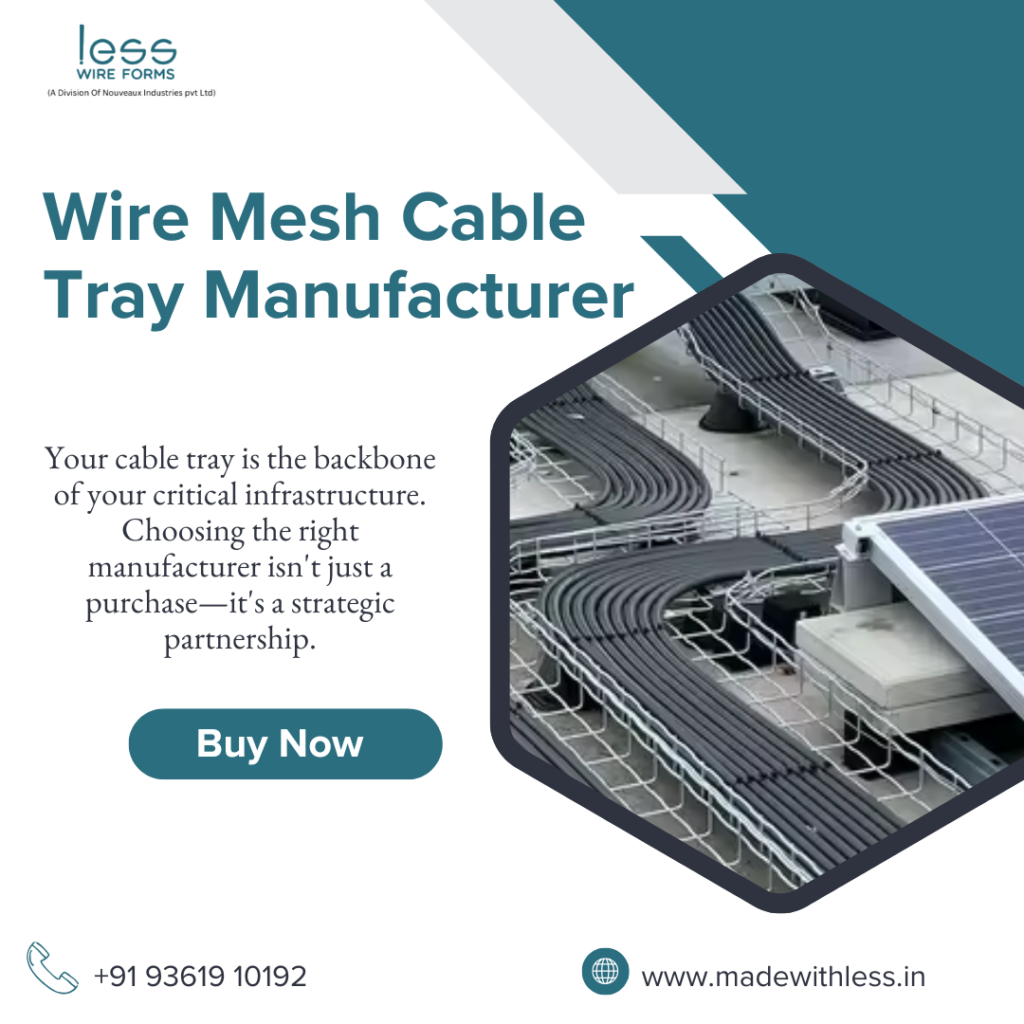In the complex world of cable management, the choice of your wire mesh cable tray system is a critical decision. It’s not just a simple rack; it’s the backbone that supports, protects, and organizes the vital nervous system of your facility—the data, power, and communication cables.
Choosing the right manufacturer is just as important as choosing the right tray. The wrong partner can lead to project delays, cost overruns, and system failures. The right one becomes an extension of your team, ensuring a smooth, efficient, and reliable installation.
So, what separates an average supplier from a world-class manufacturer? Here are the key qualities you should prioritize.
1. Proven Material Quality & Compliance
This is non-negotiable. The raw materials determine the tray’s strength, durability, and corrosion resistance.
- High-Grade Steel: Look for manufacturers who use certified, high-tensile steel wire. It should be compliant with relevant international standards (like ASTM, BS, or DIN).
- Superior Coatings: The finish is your first line of defense. Insist on high-quality coatings:
- Electro-galvanized: Good for standard indoor applications.
- Hot-Dip Galvanized: Excellent for corrosive environments, both indoors and outdoors.
- Stainless Steel (304/316): The gold standard for harsh environments like chemical plants, food processing, or coastal areas.
- Certifications Matter: A reputable manufacturer will have their materials and processes certified (e.g., ISO 9001 for quality management). Don’t be shy to ask for test certificates and material reports.
2. Robust Engineering & Design Expertise
A wire mesh tray is more than a commodity; it’s an engineered product. The manufacturer should offer more than just a catalog—they should provide solutions.
- In-House Engineering: Do they have a dedicated engineering team? This allows for custom modifications, load calculations, and technical support tailored to your specific project requirements.
- CAD/BIM Support: In today’s digital construction environment, the ability to provide detailed CAD drawings and BIM (Building Information Modeling) objects is a huge advantage. It facilitates clash detection, accurate installation, and seamless integration with other building systems.
- Load Capacity Data: They should provide clear, verifiable data on the load-bearing capacity of their trays and accessories. This is crucial for both safety and long-term performance.
3. A Comprehensive & Versatile Product Range
No two projects are identical. Your ideal manufacturer should offer a wide range of standard products and the flexibility for customization.
- Standard Offerings: Look for a full suite of products, including various widths, depths, and mesh densities, along with all necessary accessories (brackets, connectors, dividers, etc.).
- Custom Fabrication: Can they manufacture non-standard radii, special fittings, or unique finishes? A manufacturer with strong fabrication capabilities can solve on-site challenges before they happen.
- System Compatibility: Their products should be designed to work seamlessly together, creating a cohesive and reliable system from start to finish.
4. Reliability in Logistics & On-Time Delivery
In construction and industrial projects, time is money. A delayed shipment can bring an entire site to a standstill.
- Consistent Lead Times: A professional manufacturer is transparent about their lead times and has a proven track record of meeting them.
- Efficient Supply Chain: They have robust processes in place for material sourcing, production scheduling, and shipping to ensure your order arrives when and where you need it.
- Packaging: Products should be packaged securely to prevent damage during transit, ensuring they arrive on-site ready for installation.

5. Exceptional Customer Service & Technical Support
The relationship doesn’t end with the purchase order. The manufacturer should be a reliable partner throughout your project.
- Pre-Sales Support: Are they responsive and knowledgeable during the quoting and specification phase? They should help you select the right product, not just the one they want to sell.
- Post-Sales Support: What happens if you have a question during installation? Easy access to technical support can save valuable time and prevent costly mistakes.
- A Collaborative Partner: The best manufacturers view their clients as partners. They are proactive, communicative, and invested in the success of your project.
6. Competitive Value, Not Just the Lowest Price
While budget is always a consideration, the cheapest option is often the most expensive in the long run.
- Total Cost of Ownership (TCO): Consider the value over the product’s entire lifecycle. A slightly more expensive, high-quality tray that is easier to install, requires no maintenance, and lasts for decades offers far better value than a cheap alternative that fails prematurely.
- Transparent Pricing: Look for clear, logical pricing without hidden fees.
Your Checklist for Success
Before you make your final decision, ask potential manufacturers these questions:
- Can you provide material certifications and test reports?
- Do you have in-house engineering for custom solutions?
- What are your standard and expedited lead times?
- Can you supply BIM objects and detailed CAD drawings?
- What is your process for handling technical queries or issues?
Investing time in selecting the right wire mesh cable tray manufacturer pays dividends in safety, reliability, and project efficiency. By prioritizing quality, expertise, and partnership, you’re not just buying a product—you’re securing the foundation for a robust and future-proof infrastructure.
